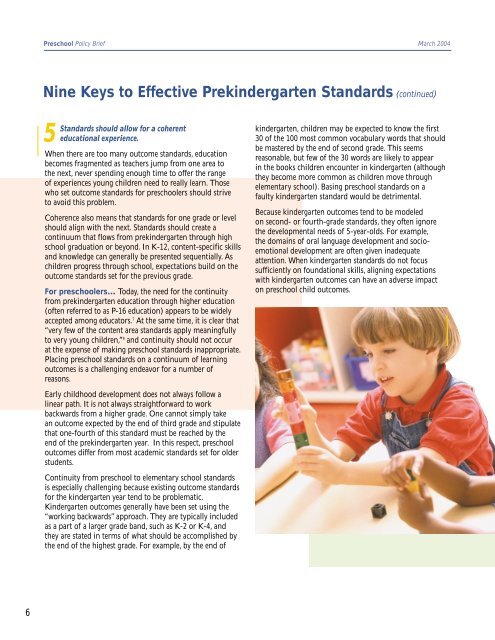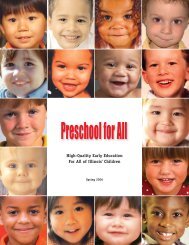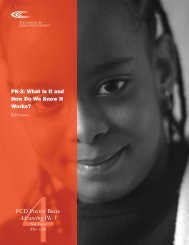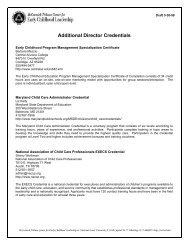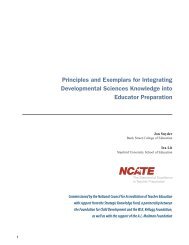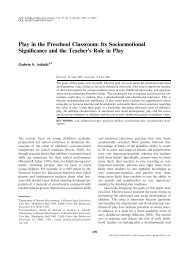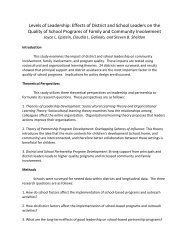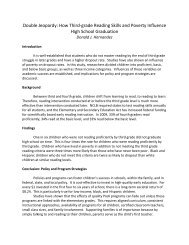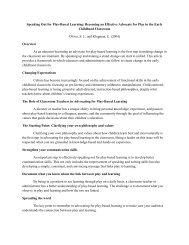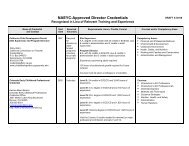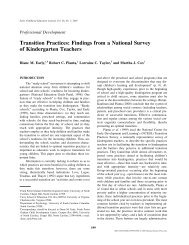Child Outcome Standards in Pre-K Programs - National Institute for ...
Child Outcome Standards in Pre-K Programs - National Institute for ...
Child Outcome Standards in Pre-K Programs - National Institute for ...
Create successful ePaper yourself
Turn your PDF publications into a flip-book with our unique Google optimized e-Paper software.
<strong>Pre</strong>school Policy Brief March 2004N<strong>in</strong>e Keys to Effective <strong>Pre</strong>k<strong>in</strong>dergarten <strong>Standards</strong> (cont<strong>in</strong>ued)5<strong>Standards</strong> should allow <strong>for</strong> a coherenteducational experience.When there are too many outcome standards, educationbecomes fragmented as teachers jump from one area tothe next, never spend<strong>in</strong>g enough time to offer the rangeof experiences young children need to really learn. Thosewho set outcome standards <strong>for</strong> preschoolers should striveto avoid this problem.Coherence also means that standards <strong>for</strong> one grade or levelshould align with the next. <strong>Standards</strong> should create acont<strong>in</strong>uum that flows from prek<strong>in</strong>dergarten through highschool graduation or beyond. In K-12, content-specific skillsand knowledge can generally be presented sequentially. Aschildren progress through school, expectations build on theoutcome standards set <strong>for</strong> the previous grade.For preschoolers… Today, the need <strong>for</strong> the cont<strong>in</strong>uityfrom prek<strong>in</strong>dergarten education through higher education(often referred to as P-16 education) appears to be widelyaccepted among educators. 7 At the same time, it is clear that“very few of the content area standards apply mean<strong>in</strong>gfullyto very young children,” 9 and cont<strong>in</strong>uity should not occurat the expense of mak<strong>in</strong>g preschool standards <strong>in</strong>appropriate.Plac<strong>in</strong>g preschool standards on a cont<strong>in</strong>uum of learn<strong>in</strong>goutcomes is a challeng<strong>in</strong>g endeavor <strong>for</strong> a number ofreasons.Early childhood development does not always follow al<strong>in</strong>ear path. It is not always straight<strong>for</strong>ward to workbackwards from a higher grade. One cannot simply takean outcome expected by the end of third grade and stipulatethat one-fourth of this standard must be reached by theend of the prek<strong>in</strong>dergarten year. In this respect, preschooloutcomes differ from most academic standards set <strong>for</strong> olderstudents.Cont<strong>in</strong>uity from preschool to elementary school standardsis especially challeng<strong>in</strong>g because exist<strong>in</strong>g outcome standards<strong>for</strong> the k<strong>in</strong>dergarten year tend to be problematic.K<strong>in</strong>dergarten outcomes generally have been set us<strong>in</strong>g the“work<strong>in</strong>g backwards” approach. They are typically <strong>in</strong>cludedas a part of a larger grade band, such as K-2 or K-4, andthey are stated <strong>in</strong> terms of what should be accomplished bythe end of the highest grade. For example, by the end ofk<strong>in</strong>dergarten, children may be expected to know the first30 of the 100 most common vocabulary words that shouldbe mastered by the end of second grade. This seemsreasonable, but few of the 30 words are likely to appear<strong>in</strong> the books children encounter <strong>in</strong> k<strong>in</strong>dergarten (althoughthey become more common as children move throughelementary school). Bas<strong>in</strong>g preschool standards on afaulty k<strong>in</strong>dergarten standard would be detrimental.Because k<strong>in</strong>dergarten outcomes tend to be modeledon second- or fourth-grade standards, they often ignorethe developmental needs of 5-year-olds. For example,the doma<strong>in</strong>s of oral language development and socioemotionaldevelopment are often given <strong>in</strong>adequateattention. When k<strong>in</strong>dergarten standards do not focussufficiently on foundational skills, align<strong>in</strong>g expectationswith k<strong>in</strong>dergarten outcomes can have an adverse impacton preschool child outcomes.6


